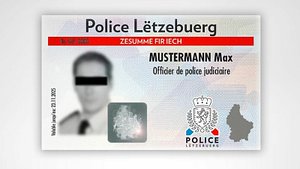
© RTL / Julia Maaluf
Join us for a particularly friendly lesson today, as we take a look at how to express appreciation (and even love) in Luxembourgish.
Join us for a particularly friendly lesson today, as we take a look at how to express appreciation (and even love) in Luxembourgish.
Moien and welcome back to another Luxembourgish Lesson! Man, don't you just LOVE these lessons? If you've followed this series up until this point, we can only assume that you at least LIKE these little lessons…
Not-at-all-heavy-handed introduction aside, today is indeed all about your likes. Or more specifically, about how to express that you like something (or someone?) in Luxembourgish. One of the key rules of successful language learning is to engage with content that interests you. The idea is that you will naturally spend more time with your target language if the learning material you use is inherently interesting to you. And the more time you spend with your language, the more of it will seep into your brain!
Following this idea, we thought that we could perhaps teach you some ways to talk about your likes, interests, and guilty pleasures.
If you're interested, you can also check out a new instalment in the 'Language Basics' series and learn how the comparative works in Luxembourgish.
Saying "I like…"
Contrary to English, there is no single verb to say that you like something. To say "I like", "you like"… etc in Luxembourgish, you have to combine a verb with gär. If the thing you like is an action, i.e. a verb (for example: I like running) you simply add gär. Thus:
I like running -> Ech lafe gär
On the other hand, if the thing you like is an object or a person (for example: I like fruit), you use the verb hunn (to have) instead. Thus:
I like fruit -> Ech hunn Uebst gär.
Here are some more examples, using all of the personal pronouns in the Present tense:
You (singular) like cats -> Du hues Kaze gär.
She likes cycling -> Hatt fiert gär Vëlo.
We like cake -> Mir hu Kuch gär.
You (plural) like dancing -> Dir danzt gär.
They like going on hikes -> Si gi gär wanderen.
However, you also have a second option in Luxembourgish. You can use the verb gefalen to express something close to the English "It pleases me". For instance:
I like this painting -> Dat Bild gefält mir (literally: "This painting pleases me")
While the use of the verb "to please" may sound a bit strange in English, it is completely acceptable and common to use it in Luxembourgish. In certain cases, it even sounds a bit more "natural" compared to the formulation with gär.
Saying "I love…"
First things first: The verb to love does not exist in Luxembourgish. There are two common ways that you can use to describe the feeling of love in Luxembourgish: hunn + gär (which we've just seen) and frou si mat ("to be happy with"). In the right context, both of these expressions can mean "to love". For example:
I love you -> Ech hunn dech gär (literally: "I like you")
Ech si frou mat dir (literally: "I am happy with you")
We should point out that frou si mat in particular can only be used to express romantic love or maternal / paternal love. For instance, while it would be perfectly fine for a mother to say Ech si sou frou mat dir! ("I love you so much!") to her child, it would be weird to say Ech si sou frou mat dem Film, even though in English it would be acceptable to say "I love this film so much!".
Some Luxembourgers might argue that there is a direct translation of to love. And it is true that if you listen to a lot of Luxembourgish, you might hear someone say something like
Ech liben dee Film!
In this sentence, the verb liben is in fact the German verb for "to love": "lieben" (in Luxembourgish you don't need the e to mark a long vowel). And while you can use it if you want, we should point out that 1) this verb is not listed in the Luxembourgish Online Dictionary (LOD) and 2) the use of this verb might cause heavy cringing on the part of some Luxembourgers (the author of this series perhaps included).
Some more phrases to express like / appreciation / approval
How cool is this! -> Wéi cool / gäil ass dat!
This is one of my favourite... -> Dat ass ee(nt) vu menge Liblings-…
(Ex: This is one of my favourite books -> Dat ass eent vu menge Liiblingsbicher)
This is amazing / fantastic / brilliant! -> Dat ass immens / fantastesch / genial!
We really enjoyed this -> Et huet eis immens gutt gefall
He had so much fun -> Et huet him sou vill Spaass gemaach
They particularly enjoyed... -> Wat hinne besonnesch gutt gefall huet war(en)…
Keep up the good work! -> Maach(t) virun esou!
This was the best thing I've ever done in my life -> Dat war dat bescht, wat ech jee a mengem Liewe gemaach hunn
We've just mentioned it but just to remind you once again that you can head over to LOD.lu if there are any other words that you want to look up in Luxembourgish!






